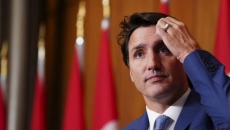VANCOUVER - British Columbians who possess up to 2.5 grams of illicit drugs for personal use will not be arrested or charged starting early next year as part of the province's request for an exemption from Canada's drug laws following a record number of overdose deaths.
The three-year exemption effective Jan. 31 will apply to drug users 18 and over and include opioids, cocaine, methamphetamine and MDMA, also known as ecstasy.
Carolyn Bennett, the federal minister of mental health and additions, said granting the exemption request is a significant policy change and the first step in much needed bold action to slow the overdose crisis.
“This is not legalization. We have not taken this decision lightly," she said.
"And with it comes great responsibility for the health, safety and well-being of the people of British Columbia and is a template for other jurisdictions across Canada."
The drugs will also not be seized from those found in possession of under the 2.5-gram threshold.
The allowable amount of illegal substances falls short of the 4.5 grams requested by B.C., that was already deemed too low by some drug-user groups that have criticized the province for failing to adequately consult them.
B.C. will become the first jurisdiction in North America to lift prohibitions on possession of small amounts of so-called hard drugs. In 2020 Oregon decriminalized such possession, but the drugs were still subject to seizure, and those in possession faced a US$100 fine.
B.C. submitted an application to the federal government last November asking for an exemption to the drug laws as part of a public health approach to the overdose crisis, which has killed nearly 10,000 people since an overdose emergency was declared in 2016.
Bennett's B.C. counterpart, Sheila Malcolmson said the approval from the federal government is a major step in changing how people view addiction and drug use in the province.
She said shame and fear have kept people from accessing the care they need, while the concern of being criminalized has led many people to hide their addiction and use drugs alone.
"And using alone can mean dying alone, particularly in this climate of tragically increased illicit drug toxicity," she said.
BC is taking the next steps toward decriminalizing small amounts of certain illicit drugs for personal use, so that we can reduce the fear and shame associated with drug use – making it clear that substance use is a public health issue, not a criminal one. pic.twitter.com/snPhpCGUUd
— Sheila Malcolmson (@s_malcolmson) May 31, 2022
Substance use is a health issue - it shouldn't be treated like a crime.
— John Horgan (@jjhorgan) May 31, 2022
BC is taking a historic step forward to help break down the stigma that stops people from accessing life-saving support.https://t.co/usYXuv0WhP
Join Sheila Malcolmson, BC Minister of Mental Health and Addictions; and Carolyn Bennett, federal Minister of Mental Health and Addictions and Associate Minister of Health, as they make a joint announcement. https://t.co/zzVyxVv1B9
— BC Government News (@BCGovNews) May 31, 2022
B.C. provincial health officer Dr. Bonnie Henry said the exemption is a vital step to keeping people alive and helping them connect to the health and social supports they need.
"By removing the fear and shame of drug use, we will be able to remove barriers that prevent people from accessing harm reduction services and treatment programs," Henry said in a statement.






